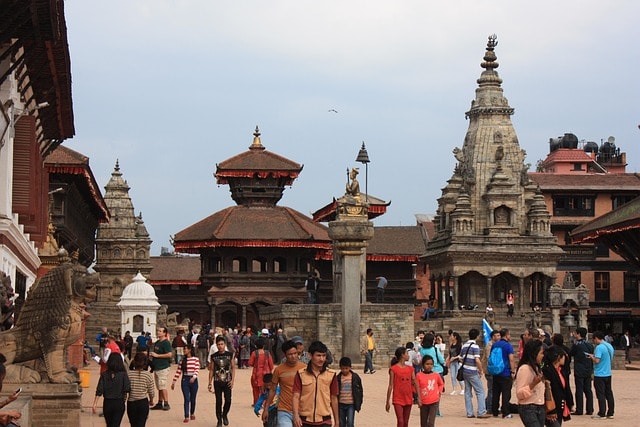Bhaktapur – The Living Museum of Nepal

A Glimpse into Bhaktapur’s Glorious Past
Bhaktapur, which means “City of Devotees,” was once the capital of the Malla Kingdom until the 15th century. It flourished as a center for art, culture, and trade along the old Silk Road. The city retains its medieval charm — red-brick buildings, intricately carved wooden windows, and temples that date back hundreds of years.
UNESCO recognized Bhaktapur as a World Heritage Site, and rightly so — it’s one of the best-preserved cultural cities in Nepal.
Fascinating Facts About Bhaktapur
Dreaming of World’s top destinations but need to keep your budget in check? Use our Travel Budget Calculator for a quick cost breakdown. Travel smart, estimate your expenses today!
-
The entire city is like an open-air museum — no modern high-rises allowed.
-
Bhaktapur is famous for Juju Dhau, aka the “King of Yogurt”.
-
Hosts Bisket Jatra, one of Nepal’s wildest and oldest festivals.
-
The city is known for its pottery, woodcraft, and traditional mask dances.
Must-Visit Places in Bhaktapur
1. Bhaktapur Durbar Square
The heart of the city, packed with palaces, statues, and temples like the 55-Window Palace, Vatsala Temple, and Nyatapola Temple — the tallest pagoda-style temple in Nepal.
2. Nyatapola Temple
A stunning five-tiered temple standing tall since 1702. Climb the steps and enjoy panoramic views of the city.
3. Pottery Square
Watch artisans mold clay into beautiful pots, or try it yourself. A great place to pick up a handmade souvenir.
4. Taumadhi Square
Home to the famous Nyatapola Temple and packed with traditional eateries, shops, and local life.
5. Dattatreya Square
Less touristy, more authentic. Here, temples and homes blend seamlessly — some buildings are over 500 years old.
Hidden Gems to Explore
1. Siddha Pokhari
A peaceful pond near the city gate, perfect for a quiet morning or golden hour photography.
2. Peacock Window
Known as the Mona Lisa of Nepalese Woodwork — hidden in a small alley near Dattatreya Square, this intricately carved window is a must-see.
3. Local Roof-Top Cafés
Climb up to a rooftop café (like Café Nyatapola or Beans The Coffee Shop) for serene views of the old city and perfect Wi-Fi for digital nomads.
4. Local Thangka Art Shops
Some family-run shops let you peek into the intricate process of making Buddhist mandalas by hand.
Travel Guide for Hostel Travellers
Where to Stay on a Budget
-
Cosy Hotel & Hostel – Friendly staff and just 5 minutes from Durbar Square.
-
Tulaja Boutique Hotel – Budget-friendly with cultural charm.
-
Peacock Guesthouse – A restored Newari house, cozy and authentic.
What to Eat
-
Juju Dhau (King Curd) – Served in clay pots, rich and creamy.
-
Bara and Chatamari – Local Newari snacks you can’t skip.
-
Samay Baji Set – A traditional Newari plate that’s a full meal and cultural experience.
How to Reach Bhaktapur
-
From Kathmandu: Take a local bus or microbus from Ratnapark (approx. 1 hour).
-
Taxi: Around NPR 800–1000.
-
Entry fee: NPR 1500 for foreign nationals (covers all squares).
Best Time to Visit
-
October to April – Clear skies and great lighting for photography.
-
During Bisket Jatra (April) – Insane energy, culture, and celebrations. Don't miss it!
Top Things to Do for Backpackers
-
Photography walk in the golden hour light.
-
Try traditional tea at a local bhatti (tea shop).
-
Take a pottery or thangka painting workshop for a creative travel memory.
-
Meditate or write in one of the peaceful courtyards.
Respect the Culture
Bhaktapur is still very much a living city. Please:
-
Dress modestly, especially near temples.
-
Don’t climb on monuments.
-
Support local artisans by buying directly from them.
Why Backpackers Fall in Love with Bhaktapur
It’s slow travel heaven. No honking chaos, just bells, laughter, and the gentle rhythm of traditional life. Here, you can get lost on purpose, snack your way through Newari cuisine, and find art in every corner. And all this — just an hour away from Kathmandu.
Whether you're an architecture geek, a history lover, or just someone who wants a peaceful escape — Bhaktapur offers you a window to Nepal’s soul.

